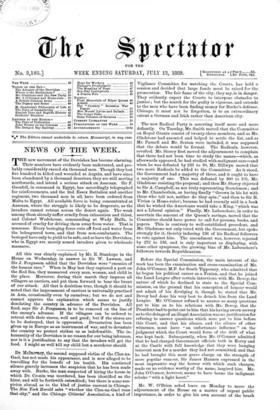The new Radical Party is asserting itself more and more
defiantly. On Tuesday, Mr. Smith moved that the Committee on Royal Grants consist of twenty-three members, and as Mr. Gladstone had assented and helped to settle the list, and as Mr. Parnell and Mr. Sexton were included, it was supposed that the debate would be formal. The Radicals, however, revolted. Mr. Storey first moved the adjournment to complain that there had not been time to study the names—which, as afterwards appeared, he had studied with malignant care—and when he was defeated by 233 to 80, Mr. Dillwyn moved that two more Radicals be added to the Committee. As it stood, the Government had a majority of three, and it ought to have a majority of one. This was defeated by 300 to 105, Mr. Gladstone resisting the proposal; and then Mr. Storey objected to Sir A. Campbell, as not truly representing Scotchmen ; and to Mr. Chamberlain, as having finally "thrown in his lot with those who toil not, neither do they spin ;" and then to Sir H. Vivian (a Home-ruler), because he had recently said in a book that he wished the Americans would take a King, "which was not a Liberal opinion." Finally, Mr. Labouchere, in order to ascertain the amount of the Queen's savings, moved that the Committee should have power to call for persons, books, and papers. This is contrary to well-established precedent, and Mr. Gladstone not only voted with the Government, but spoke strongly for it, thereby inducing 136 of his Radical followers to vote against him. The amendment was, however, rejected by 272 to 136, and is only important as displaying, with some other symptoms, the growing bias of Mr. Labouchere's followers towards Republicanism.


































